The Chromebook Pixel (2015) Review
by Brandon Chester on March 16, 2015 8:00 AM EST- Posted in
- Laptops
- Chrome OS
- Chromebook
- Chromebook Pixel
CPU Performance
Chrome OS is extremely lightweight, which makes sense for an operating system that has to run on processors that range from Intel's Core i7 at the high end, to Intel Atom and ARM processors at the low end. Most devices running Chrome OS are closer to that lower end, and that coupled with the web application nature of Chrome OS doesn't make it a large target for benchmark developers. The situation is arguably even worse than mobile benchmarking since the only benchmarks a device can be tested in are web benchmarks, but we have to work with what we have. The new Chromebook Pixel is powered by Intel's Core i5-5200U processor, which is one of Intel's new Broadwell-U parts.
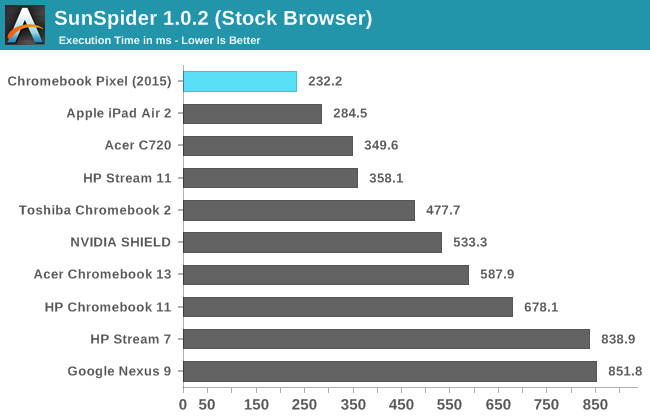
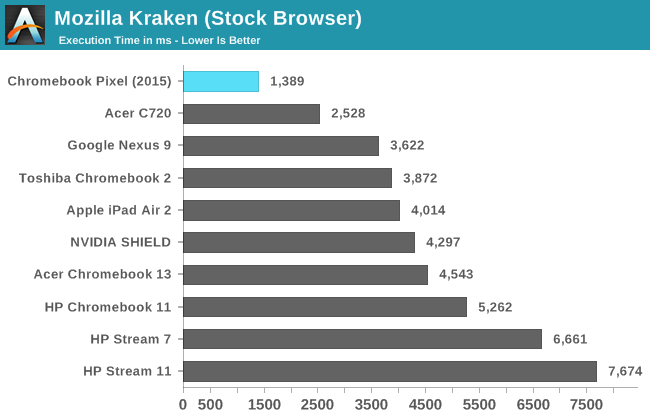
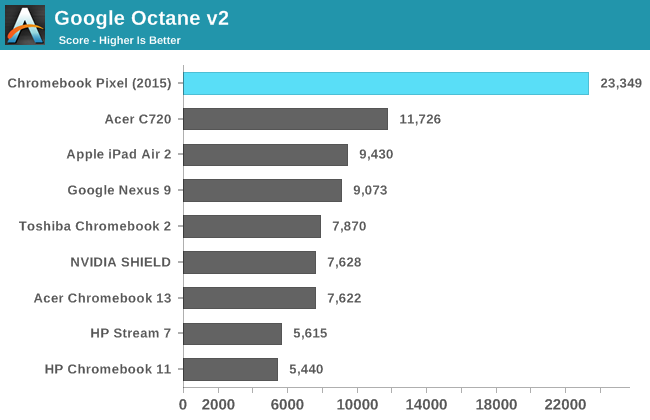
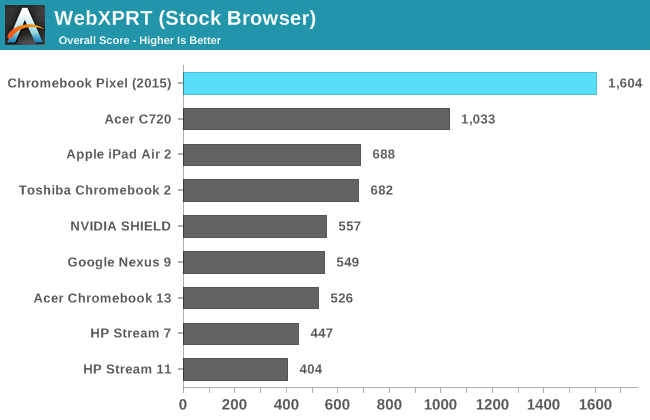
| Additional Performance Results | ||||
| Acer C720 | Acer CB13 | Toshiba Chromebook 2 | Chromebook Pixel (2015) | |
| CrXPRT | 96 | 55 | 61 | 161 |
| Spacerocks (WebGL - FPS) | 18 | 30 | 11 | 45 |
The CPU performance of the original Pixel could be described as completely overkill for running Chrome OS, and the same is true for this year's iteration. The Pixel gives you whats is undoubtedly the smoothest and fastest Google Chrome experience available. While I find the performance of an Intel i5 to be unnecessary to do something as simple as run Chrome and web apps, it definitely comes in handy if you're running some other version of Linux overtop of Chrome OS.
WiFi Performance
The 2013 Chromebook Pixel had dual spatial stream 802.11n WiFi and Bluetooth 3.0. In early 2013, this was fairly common among laptops, although 802.11ac adoption on high end laptops began not long after. The 2015 Chromebook Pixel uses Intel's Intel 7260 WiFi + BT 4.0 module, with 2x2 802.11ac support. This brings the max theoretical WiFi speed up to 866Mbps, a substantial improvement over the 300Mbps max on the 2013 model. Real world performance will almost always be lower than theoretical maximums, and to test WiFi performance I've used iPerf to get an idea of what the maximum throughput is on the Pixel.
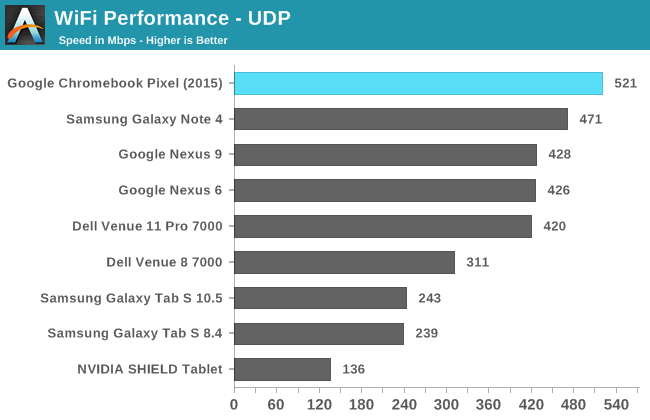
In most of our tests I've compared the Pixel to other Chromebooks, tablets, and smartphones. This is mostly due to the previously mentioned benchmarking limitations on Chrome OS. To keep consistent with this, and to avoid making unfair comparisons to laptops which aren't tested using iPerf, I've just run the Pixel through our smartphone/tablet WiFi benchmark. This still gives an idea of how fast the Pixel is, without comparing it to other laptops that were not tested in the exact same manner.










123 Comments
View All Comments
chlamchowder - Monday, March 16, 2015 - link
But since you have a Windows machine already, why spend the extra money on a Chromebook when that machine can already cruise the internet (and more)?It's like having a car, and then buying another car...
Hanoveur - Monday, March 16, 2015 - link
Okay, I'll drag my desktop PC downstairs just to cruise the web when I'm watching TV. That makes sense.steven75 - Wednesday, March 18, 2015 - link
Or replace the desktop with one real $1,000 laptop like everyone else?Hanoveur - Wednesday, March 18, 2015 - link
I guess I don't want to be like everyone else since I build my own PCs.coder543 - Monday, March 16, 2015 - link
I disagree with that comment, but sure, believe whatever you want to about Chrome OS.For 95% of consumers, an iPad is all they need for their daily computational lives. They literally *Do not* need a full computer. A Chromebook is like an iPad with a keyboard, USB ports, and flash player. It really is good enough for the majority of consumers. For the people who need more, Crouton allows you to easily have access to a true Linux desktop environment in parallel with ChromeOS -- switching between them with a keyboard shortcut. Full Linux is sufficient for anyone who doesn't require exact pieces of specialized software, which is the vast majority of people. They may have preferences for pieces of software, but there are Linux equivalents that are awesome in most cases.
So, no, this is not a toy computer, and no, you don't "need" to own a real computer in addition to it.
I really wish it had more storage by default -- that is a fair criticism. Everything about this device is justifiable except that, which is just a poor decision by Google.
chlamchowder - Monday, March 16, 2015 - link
The storage limitation is justifiable if it's used as a thin client.What turns me off is that it is a thin client. It's expensive and/or difficult to get a very high speed internet connection. ISPs in the US just aren't that good. When traveling, it might even be impossible (and Chromebooks are laptops/ultrabooks...see where the problem is?). But that's how it was designed.
andychow - Monday, March 16, 2015 - link
That's why I love it. I don't understand people "only 32GB". Really? That sounds overkill. Under normal circumstances, it's a device you will never store any files on.It's a thin client, but a nice one with no lag, a nice screen and great battery life. I'm getting one to replace my other chromebook.
Hanoveur - Monday, March 16, 2015 - link
I use a Synology NAS as extra storage for all the computers in my home, including my Chromebook. I have my own private cloud. But then again, some people are digital packrats...they want to make sure they have terabytes of movies and music with them at all times for some strange reason...and then they lose their devices and media. Not to mention the amount of time they spend transferring it all.ppi - Monday, March 16, 2015 - link
Cloud storage (even home NAS) will not save you if you are on the travel. Especially in Europe - imagine you go with family skiing to Austria, and you want to have along some movies for your kids. Data roaming is insanely expensive (think €50 for 10MB data) and WiFi in hotels or rented apartments is not standard either.Also, i7 on a device that can do only as much as Chromebook is a waste. Core-M would be more appropriate.
cjb110 - Tuesday, March 17, 2015 - link
your skiing in Austria and you take a laptop with you? why? who cares what laptop is? The scenario you've invented makes little sense for any laptop Windows, Apple or Google.